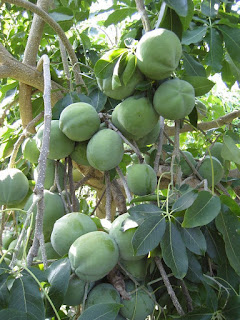Future Crops Go Back Thousands of Years
Future of Food - Forgotten Crops, Measured by Nutrition Not Yield
Wednesday Series: Innovation Addressing the World's Most Pressing Needs - Food
Land of Forgotten Crops
At the global headquarters in Malaysia of "Crops for the Future", scientists are reviving and cultivating crops relegated to the sidelines. They have a reason. Just 4 crops - soybeans, wheat, rice and maize - provide 2/3 of the world's food supply. The global dependency is huge and it's leading to increasingly uniform diets. Diversifying the food supply with alternative crops is an urgent need.
7,000 Ignored Crops Go Back Thousands of Years
There are 7,000 crops farmed for thousands of years that are now ignored and sidelined. They are being re-cultivated at Crops for the Future. An example is a tart berry called the kedondong. It's being converted into a sugar-free juice that's high in Vitamin C and great in taste. Another is the Moringa tree, whose leaves are being use as a replacement for wheat flour. And the bombara groundnut which is a high protein legume. A hot example is Quinoa, a nutritious grain unheard of 30 years ago.
Perfect Harvest
By 2050, the world must provide 50% more food to feed the projected population of 10 billion. The food sector is already contributing to 1/3 of global greenhouse gas emissions. Meeting the escalating demand for food without escalating climate change is an urgent need.
Forgotten Crops - An Answer
To meet the world's pressing need for food, innovative ways of bringing back forgotten crops is a key. They can be farmed locally, without global transportation. Being local, they increase food security. And most importantly they are more nutritious and climate resistant having been developed over thousands of years. It's innovation, research and reaching back to the past to address one of the world's most pressing needs - Food.
Wednesday Series: Innovation Addressing the World's Most Pressing Needs - Food
Land of Forgotten Crops
At the global headquarters in Malaysia of "Crops for the Future", scientists are reviving and cultivating crops relegated to the sidelines. They have a reason. Just 4 crops - soybeans, wheat, rice and maize - provide 2/3 of the world's food supply. The global dependency is huge and it's leading to increasingly uniform diets. Diversifying the food supply with alternative crops is an urgent need.
7,000 Ignored Crops Go Back Thousands of Years
There are 7,000 crops farmed for thousands of years that are now ignored and sidelined. They are being re-cultivated at Crops for the Future. An example is a tart berry called the kedondong. It's being converted into a sugar-free juice that's high in Vitamin C and great in taste. Another is the Moringa tree, whose leaves are being use as a replacement for wheat flour. And the bombara groundnut which is a high protein legume. A hot example is Quinoa, a nutritious grain unheard of 30 years ago.
Perfect Harvest
By 2050, the world must provide 50% more food to feed the projected population of 10 billion. The food sector is already contributing to 1/3 of global greenhouse gas emissions. Meeting the escalating demand for food without escalating climate change is an urgent need.
Forgotten Crops - An Answer
To meet the world's pressing need for food, innovative ways of bringing back forgotten crops is a key. They can be farmed locally, without global transportation. Being local, they increase food security. And most importantly they are more nutritious and climate resistant having been developed over thousands of years. It's innovation, research and reaching back to the past to address one of the world's most pressing needs - Food.

%20(1)%20(1)%20(3)%20(2)%20(2).jpg)


Comments
Post a Comment